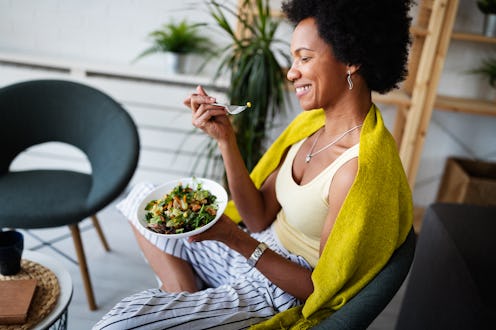(Health)
This Trendy Superfood Could Be Causing Bloating Issues
You probably had it for lunch.

Bloating is like rain. You know it can come at any point, you just don’t know what will trigger it. It’s literally a health issue that impacts everyone at some in various ways and intensities. Even the healthiest and “cleanest” among us has likely experienced the discomfort of a ballooning, aching tummy. And while bloating can come at any point for any reason (depending on your body, there are certain foods to consume (and avoid) to help keep it at bay, begging the question: Do vegetables make you bloated? And, more importantly, what is the best way to eat fruits and vegetables to prevent bloating?
“It’s really important to pay attention to bloat, especially when it comes on suddenly or is prolonged with pain,” explains Dr. Niket Sonpal, Adjunct Assistant Professor at Touro College of Osteopathic Medicine, Board Certified in Internal Medicine specializing in gastroenterology, digestive health and nutrition. “It is possible to develop an overgrowth of bacteria in the small intestine which gives that distended belly and full feeling.”
And while many turn to loading up on fiber-rich vegetables to reduce bloating, Emily Tills, Registered Dietitian and Nutrition Coach, says this is not always the best plan of attack as not all fruits and vegetables are created equal. “You want to choose fruits and vegetables that are higher in fiber, like apples, dark, leafy greens, crunchier vegetables, and berries for the best fiber amount,” says Tills to TZR.
Also, the way in which you cook said foods is also a factor here. For instance, if you’re into blending vegetables vs. eating them whole, you might want to rethink your approach. “Fresh, uncooked fruits and vegetables will have higher amounts of fiber than those that have been cooked or made into a smoothie as the fiber can get broken down in the cooking process and in the blending process,” says Tills. “Steaming is a great way to cook your vegetables without decreasing the amount of fiber and maintaining the nutrient quality.”
That said, even raw veggies in their purest form can steer you wrong. Apparently, there are a number of things to consider when turning to Mother Nature to beat the bloat for good. Ahead, health and wellness experts sound off on the fruits and veggies to reach for and those to avoid to keep your tummy in good shape — as well as various methods to eat them for optimum nutritional value.
Know Your Digestion System & Cook Accordingly
Not all stomachs are created equally, so catering to your issues and patterns is key. "In individuals with IBS (irritable bowel syndrome) we'd be more likely to recommend cooked fruits and vegetables," says Monica Auslander Moreno, MS, RD, LD/N, nutrition consultant for RSP Nutrition. "However, for certain types of constipation-related bloat, we might recommend more raw fruit and vegetables to help with transit." The nutritionist adds that while dried fruits can be helpful in small portions for the latter condition, relying on the candy-like foods is not ideal. "Fresh fruit is generally preferred more often since dried fruits tend to have more sugar and fewer nutrients (and less water)," says Moreno.
Avoid Raw Cruciferous Vegetables In Excess
While low-carb, crunchy veggies like broccoli, kale, and cauliflower for anti-bloating solutions are trendier than ever, when consumed raw and in excess, they can sometimes work against you. Yes, going raw with your plant-based foods is often the best way to go for optimum nutrition. However, the high fiber content in some veggies can be overkill for your stomach and cause it to bloat, so be sure to mix things up a bit.
"Cauliflower has become the 'it' vegetable because it takes on the flavor of anything it’s mixed with," says Dr. Sonpal. "We see recipes for cauliflower mashed, cauliflower pizza, fried rice, and even mac and cheese; all created with cauliflower as the main ingredient. When cooked, these vegetables are great sources of nutrition and fine side dish substitutes for pasta, rice, and potatoes. However, when cauliflower is chopped up and eaten raw along with kale, broccoli and Brussels sprouts you can expect bloating to occur. Cooking is key."
Water-Rich Fruits & Veggies Are Your Friends
Opting for plant-based foods that are rich in water can create a flushing effect that'll keep your stomach bloat-free, especially when consumed raw. Cucumbers, for example are a great tummy-taming snack, says Dr. Sonpal. "They’re known to reduce swelling and they contain the flavonoid antioxidant, quercetin," he says. "Cool crisp and delicious they’re common to salads and they can also be eaten solo as a snack. You can also add them to water."
Watermelon is another worthy option. "Chunks of watermelon are low calorie and filled with water (over 90 percent) and very low sugar," says Dr. Sonpal. "Watermelons are mostly water — about 92 percent— but this refreshing fruit is soaked with nutrients. Each juicy bite has significant levels of vitamins A, B6, and C, lots of lycopene antioxidants, and amino acids. There's even a modest amount of potassium."
This article was originally published on